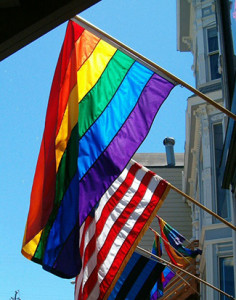This post originally appeared on the SAGE Blog.
 Many don’t know that same-sex spouses in non-marriage states still don’t qualify for all the same federal benefits that their different sex counterparts enjoy, simply because they are married to someone of the same sex. This is an issue that comes up in the context of Social Security, Veterans Administration, and some Medicare benefits. And it is all the more important for LGBT older adults who face pronounced poverty and lack of access to culturally competent healthcare.
Many don’t know that same-sex spouses in non-marriage states still don’t qualify for all the same federal benefits that their different sex counterparts enjoy, simply because they are married to someone of the same sex. This is an issue that comes up in the context of Social Security, Veterans Administration, and some Medicare benefits. And it is all the more important for LGBT older adults who face pronounced poverty and lack of access to culturally competent healthcare.
This topic is one that our Executive Director, Michael Adams, examines in detail with his latest op-ed Why Marriage Equality Matters for Older Americans.“Marriage has proven highly effective for improving the lives of many older people,” and given the unique issues our LGBT older adult population face, marriage “could be even more beneficial for older same-sex couples than it has been for older straight couples.”
Adams writes:
“Incredibly, two years after the Supreme Court struck down the Defense of Marriage Act’s prohibition on federal recognition of same-sex marriages, some married same-sex couples are still being denied federal benefits especially important to older adults. This is because some federal agencies use the “place of domicile” rule to determine whether a couple is considered married. As a result, bereaved widows like Kathy continue to be denied Social Security survivors’ benefits because the state in which they live does not recognize their marriage.”
With this in mind, SAGE is proud to endorse a bill, the ‘‘Social Security and Medicare Parity Act of 2015,’’ being introduced this week by Representative Mark Takano (D. CA), which would provide equal spousal and survivor benefits, create more flexible marriage tenure requirements, and require the Social Security Administration to engage in more outreach to LGBT older adults so that they are made aware of new or increased benefits.
In addition, SAGE, with the assistance of Jack Nadler as the lead lawyer from the firm Squire Patton Boggs, recently filed an amicus brief related to Obergefell v. Hodges. This historic case will be heard next week and allows the U.S. Supreme Court to determine whether the U.S. Constitution requires every U.S. state to issue marriage licenses to same-sex couples, and to recognize marriages of same-sex couples lawfully performed in any other state. SAGE filed the brief with the National Committee to Preserve Social Security and Medicare, Justice in Aging, National Hispanic Council on Aging, and the American Society on Aging. To learn more about the brief and our four major arguments, click here.
The opinions expressed in this article are those of the author and do not necessarily reflect those of the Diverse Elders Coalition.

